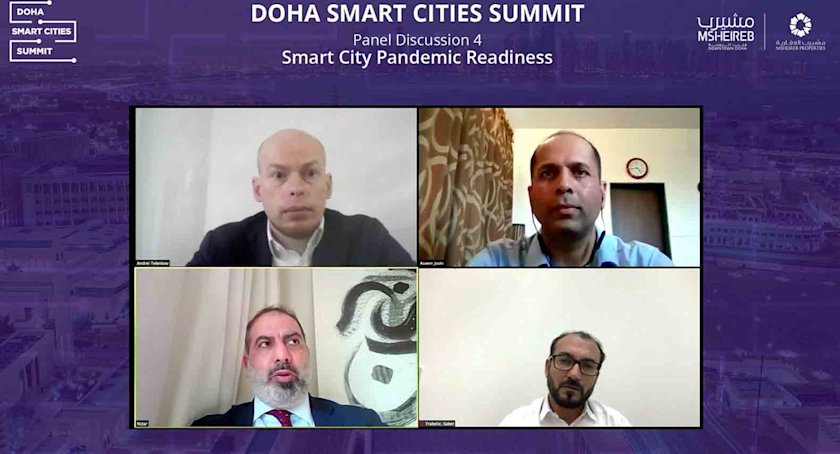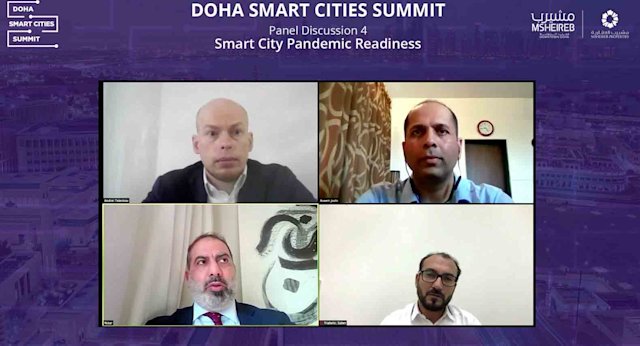Together For A Healthier World
In a year when healthcare was perhaps as high on the global agenda as it has ever been, Qatar Foundation demonstrated its capacity to bring the world together – even virtually – to discuss and identify how challenges can be overcome through innovation and collaboration.
Under the banner of One World, Our Health, the World Innovation Summit for Health (WISH) 2020 gathered international health ministers, public health leaders, scientists, academics, policymakers, and tens of thousands of attendees for a five-day exploration of the most crucial global health topics – from COVID-19 and immunotherapy to the impact of climate change on wellbeing.
For the first time, QF’s global healthcare initiative WISH staged its summit in virtual form, with WISH 2020 calling for growing health disparities to be addressed; the acceleration of new avenues of care through digital health solutions; a greater focus on children’s health, particularly in conflict or trauma situations; and for the growing pattern of misinformation surrounding healthcare to be guarded against.
In a year when healthcare was perhaps as high on the global agenda as it has ever been, Qatar Foundation demonstrated its capacity to bring the world together – even virtually – to discuss and identify how challenges can be overcome through innovation and collaboration.
Under the banner of One World, Our Health, the World Innovation Summit for Health (WISH) 2020 gathered international health ministers, public health leaders, scientists, academics, policymakers, and tens of thousands of attendees for a five-day exploration of the most crucial global health topics – from COVID-19 and immunotherapy to the impact of climate change on wellbeing.
For the first time, QF’s global healthcare initiative WISH staged its summit in virtual form, with WISH 2020 calling for growing health disparities to be addressed; the acceleration of new avenues of care through digital health solutions; a greater focus on children’s health, particularly in conflict or trauma situations; and for the growing pattern of misinformation surrounding healthcare to be guarded against.
In a pandemic-dominated year, QF united the global healthcare community to address our greatest health challenges – and how they can be overcome through innovation and collaboration.
Great session on pathways to disease eradication with global health heroes Dr. Don Hopkins & Dr. Bill Foege and Carter Center Guinea Worm Program Director Adam Weiss.#virtualwish2020 #BeatNTDs@WISHQatar @BBCWorld pic.twitter.com/NYL7Yrb6KJ
— The Carter Center (@CarterCenter) November 15, 2020
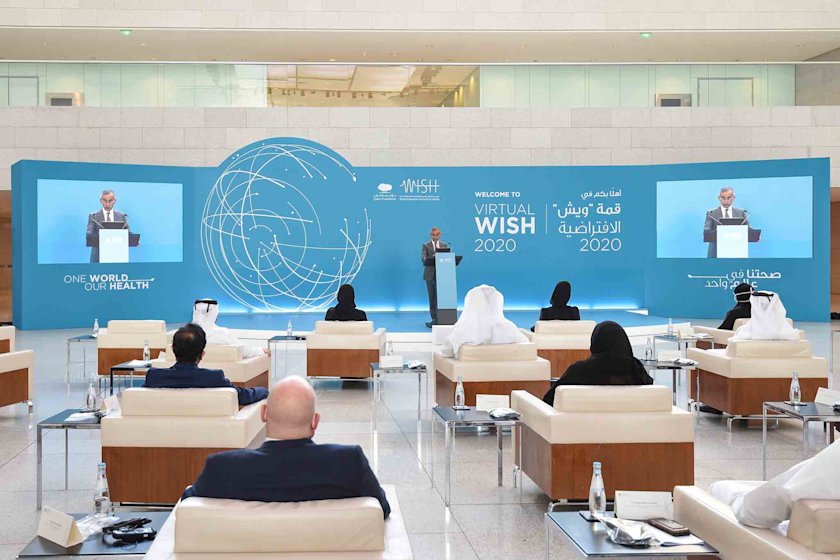
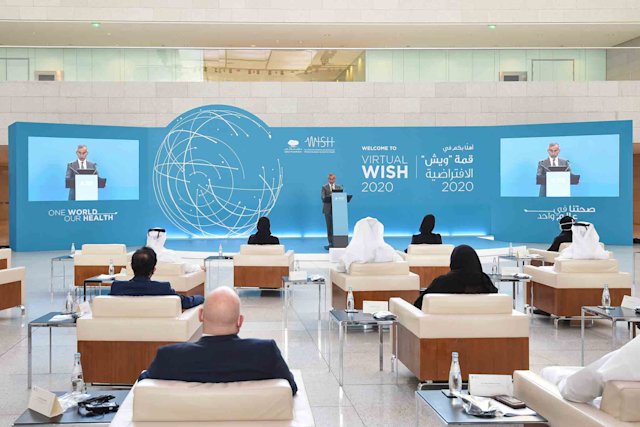
A collective responsibility
Opening WISH 2020, Her Highness Sheikha Moza bint Nasser, Co-Founder and Chairperson of Qatar Foundation, told its international audience: “In the midst of these trying times brought on by the pandemic, WISH is convening this year to elevate our sense of collective responsibility and unite the world as one – to work together, to share knowledge, to contain this pandemic, and to minimize the damage until it is possible for scientists and researchers to restore health security for people everywhere.
“And so, I salute healthcare workers in Qatar, and globally, for their tremendous efforts in fighting this pandemic, protecting lives, and tirelessly striving to create a better, healthier world.”
Professor the Lord Darzi of Denham, Executive Chair of WISH, emphasized that the pandemic has “taught us there can be no security without health security”, saying: “That’s why I believe it’s time to build a ‘global pathogen shield’ to protect us from novel diseases.
“The only way to do that is through greater international collaboration – which is exactly what WISH is all about.”
Opening WISH 2020, Her Highness Sheikha Moza bint Nasser, Co-Founder and Chairperson of Qatar Foundation, told its international audience: “In the midst of these trying times brought on by the pandemic, WISH is convening this year to elevate our sense of collective responsibility and unite the world as one – to work together, to share knowledge, to contain this pandemic, and to minimize the damage until it is possible for scientists and researchers to restore health security for people everywhere.
“And so, I salute healthcare workers in Qatar, and globally, for their tremendous efforts in fighting this pandemic, protecting lives, and tirelessly striving to create a better, healthier world.”
Professor the Lord Darzi of Denham, Executive Chair of WISH, emphasized that the pandemic has “taught us there can be no security without health security”, saying: “That’s why I believe it’s time to build a ‘global pathogen shield’ to protect us from novel diseases.
“The only way to do that is through greater international collaboration – which is exactly what WISH is all about.”
I salute healthcare workers in Qatar, and globally, for their tremendous efforts in fighting this pandemic, protecting lives, and tirelessly striving to create a better, healthier world
WISH 2020 was the World Innovation Summit for Health’s 5th global summit
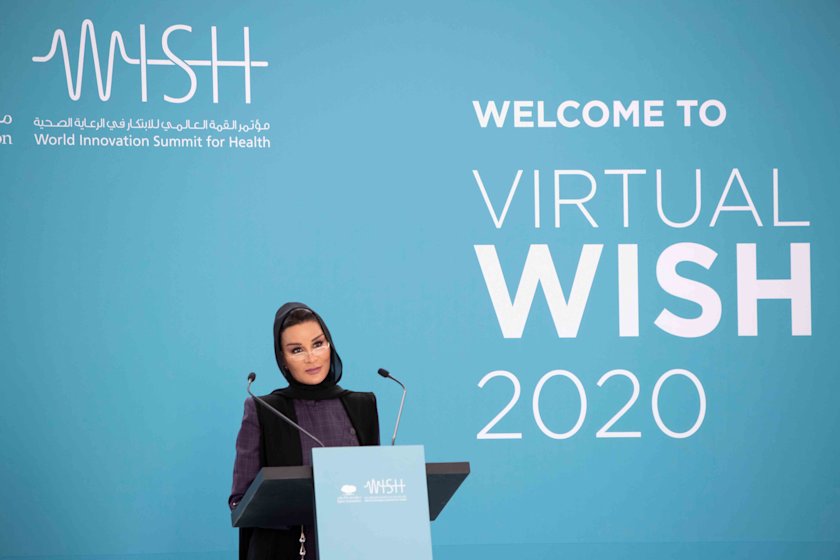
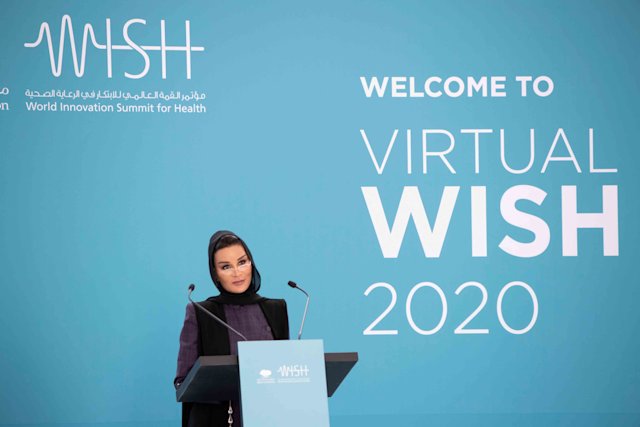
Innovation for everyone
More than 60,000 people joined WISH 2020, which featured over 300 speakers and 100 sessions – making the fifth biennial WISH Summit the most broad-ranging to date.
Over the course of the summit, more than 15 policy-focused research reports were released, with core research areas stretching from digital technologies and mental health to climate change, the role of schools in child health, and health challenges associated with major sporting events.
It saw Dr. Tedros Adhanom Ghebreyesus, Director-General of the World Health Organization, call for the world to ensure all countries benefit from innovation, as he said: “The pandemic is a once-in-a-century crisis, but it is also an opportunity to harness the power of innovation for the healthier, safer, and more sustainable world we all want.”
Keynote speakers also included actors Eva Longoria and Morgan Freeman, while WISH 2020 heard from experts such as Dr. Anthony Fauci, Director of the US’ National Institute of Allergy and Infectious Diseases, and a member of the White House coronavirus task force.
More than 60,000 people joined WISH 2020, which featured over 300 speakers and 100 sessions – making the fifth biennial WISH Summit the most broad-ranging to date.
Over the course of the summit, more than 15 policy-focused research reports were released, with core research areas stretching from digital technologies and mental health to climate change, the role of schools in child health, and health challenges associated with major sporting events.
It saw Dr. Tedros Adhanom Ghebreyesus, Director-General of the World Health Organization, call for the world to ensure all countries benefit from innovation, as he said: “The pandemic is a once-in-a-century crisis, but it is also an opportunity to harness the power of innovation for the healthier, safer, and more sustainable world we all want.”
Keynote speakers also included actors Eva Longoria and Morgan Freeman, while WISH 2020 heard from experts such as Dr. Anthony Fauci, Director of the US’ National Institute of Allergy and Infectious Diseases, and a member of the White House coronavirus task force.
The pandemic is a once-in-a-century crisis, but it is also an opportunity to harness the power of innovation for the healthier, safer, and more sustainable world we all want
WISH 2020 In Numbers
- 63,000+ attendees from 171 countries
- 300+ speakers
- 100 sessions
- 15+ research reports
- 30 winners of WISH’s Innovation Competition
- 10 core research areas
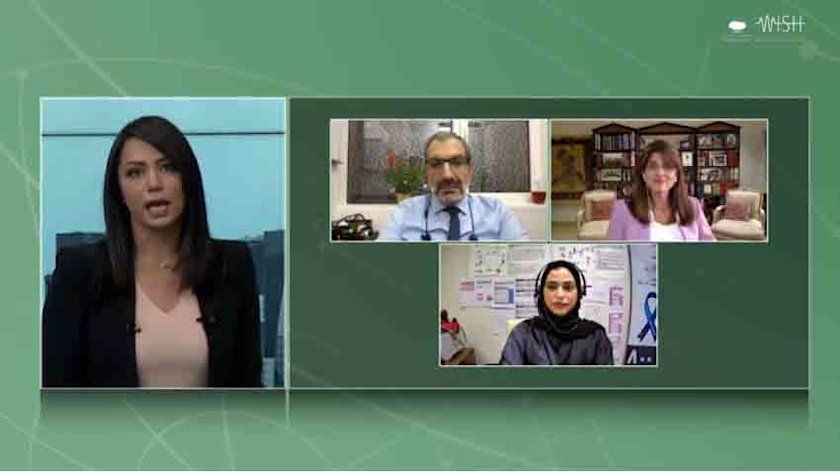
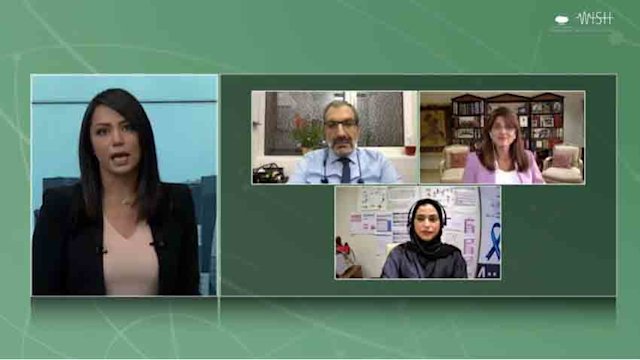
The 2nd report developed through QF’s partnership with the Economist Intelligence Unit was launched at WISH 2020 – focusing on precision medicine
Precision medicine is an approach that will lead to better care, health and social outcomes. But can it be easily integrated into existing healthcare systems? Learn more in our new report, sponsored by Qatar Foundation. https://t.co/iJR5OiFcsq (Via @QF)
— The Economist Intelligence Unit (@TheEIU) November 20, 2020
Putting health at the community’s heart
The importance of healthy living was driven home, and a spotlight shone on the dedication of Qatar’s healthcare professionals, as Doha Healthcare Week unfolded in the days leading up to WISH 2020.
Created by WISH, the week offered activities for people of all ages, including mental and physical wellbeing sessions, health checks, cooking classes, workshops, webinars, and competitions, with outdoor events reflecting physical distancing guidelines.
Self-guided WISH Walks in Qatar’s parks promoted active living, alongside a cycling challenge, yoga classes, and a community 12k run. The therapeutic effects of art and music were highlighted, while an open-air Healthcare Heroes photography exhibition was organized in partnership with Hamad Medical Corporation, the Ministry of Public Health, and the Primary Health Care Corporation.
Diabetes, women’s health, and lung cancer were all placed in focus during Doha Healthcare Week, with a session for healthcare innovators and entrepreneurs being held with the Ministry of Transport and Communications. QF-based support came from Sidra Medicine, Weill Cornell Medicine-Qatar, Qatar Diabetes Association, and QF’s Qatar Reads initiative.
The importance of healthy living was driven home, and a spotlight shone on the dedication of Qatar’s healthcare professionals, as Doha Healthcare Week unfolded in the days leading up to WISH 2020.
Created by WISH, the week offered activities for people of all ages, including mental and physical wellbeing sessions, health checks, cooking classes, workshops, webinars, and competitions, with outdoor events reflecting physical distancing guidelines.
Self-guided WISH Walks in Qatar’s parks promoted active living, alongside a cycling challenge, yoga classes, and a community 12k run. The therapeutic effects of art and music were highlighted, while an open-air Healthcare Heroes photography exhibition was organized in partnership with Hamad Medical Corporation, the Ministry of Public Health, and the Primary Health Care Corporation.
Diabetes, women’s health, and lung cancer were all placed in focus during Doha Healthcare Week, with a session for healthcare innovators and entrepreneurs being held with the Ministry of Transport and Communications. QF-based support came from Sidra Medicine, Weill Cornell Medicine-Qatar, Qatar Diabetes Association, and QF’s Qatar Reads initiative.
2020 saw the 2nd edition of Doha Healthcare Week
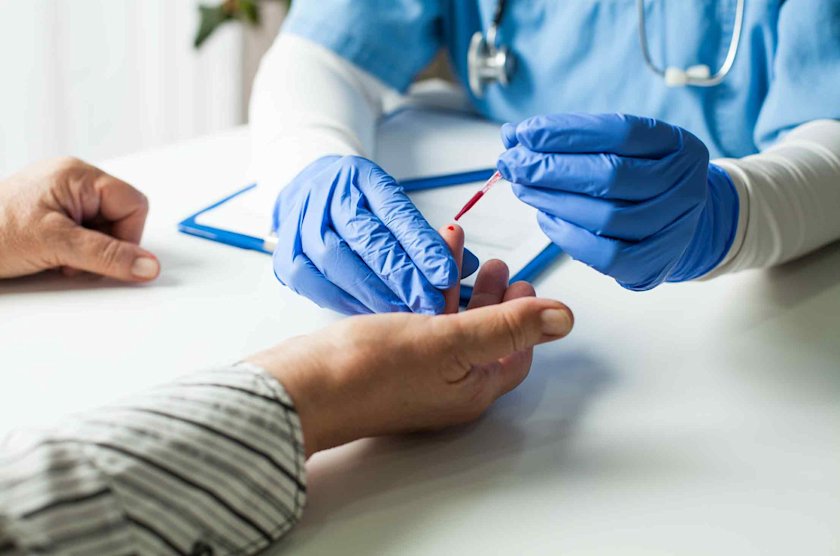
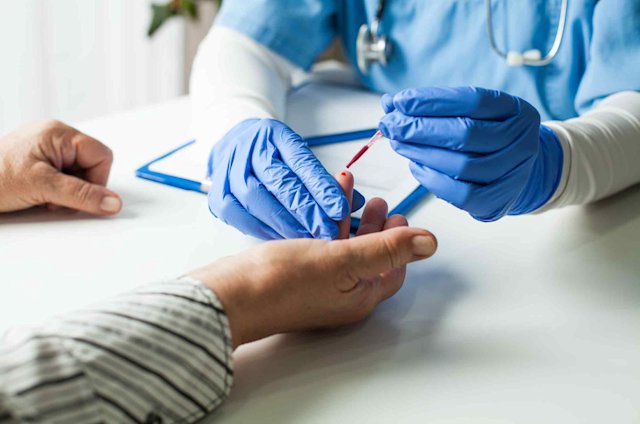
Expanding the opportunity to excel
As QF marked 25 years of empowering people to explore, create, and realize their potential, its commitment to providing opportunities for children and young people who can lead, innovate, and make change happen into the future expanded.
The QF 25th Anniversary Scholarships, spanning both school and university education, will support 19 high school students along their educational journey, and six Master’s program students at QF member Hamad Bin Khalifa University (HBKU) across a two-year period.
“Our 25th anniversary is an apt time for us to expand the range of scholarships we already offer, opening up more educational opportunities for talented students who are determined to make a contribution to society, and whose character shines through within and beyond the classroom,” said Buthaina Ali Al Nuaimi, President of Pre-University Education, QF.
Dr. Ahmad M. Hasnah, President of HBKU, said: “As Qatar Foundation marks its 25th anniversary, the QF Scholarships present a reaffirmation of its commitment to scholarly exchange and the provision of a remarkable educational experience.”
As QF marked 25 years of empowering people to explore, create, and realize their potential, its commitment to providing opportunities for children and young people who can lead, innovate, and make change happen into the future expanded.
The QF 25th Anniversary Scholarships, spanning both school and university education, will support 19 high school students along their educational journey, and six Master’s program students at QF member Hamad Bin Khalifa University (HBKU) across a two-year period.
“Our 25th anniversary is an apt time for us to expand the range of scholarships we already offer, opening up more educational opportunities for talented students who are determined to make a contribution to society, and whose character shines through within and beyond the classroom,” said Buthaina Ali Al Nuaimi, President of Pre-University Education, QF.
Dr. Ahmad M. Hasnah, President of HBKU, said: “As Qatar Foundation marks its 25th anniversary, the QF Scholarships present a reaffirmation of its commitment to scholarly exchange and the provision of a remarkable educational experience.”
As Qatar Foundation marks its 25th anniversary, the QF Scholarships present a reaffirmation of its commitment to scholarly exchange and the provision of a remarkable educational experience
25 students will benefit from the QF 25th Anniversary Scholarships
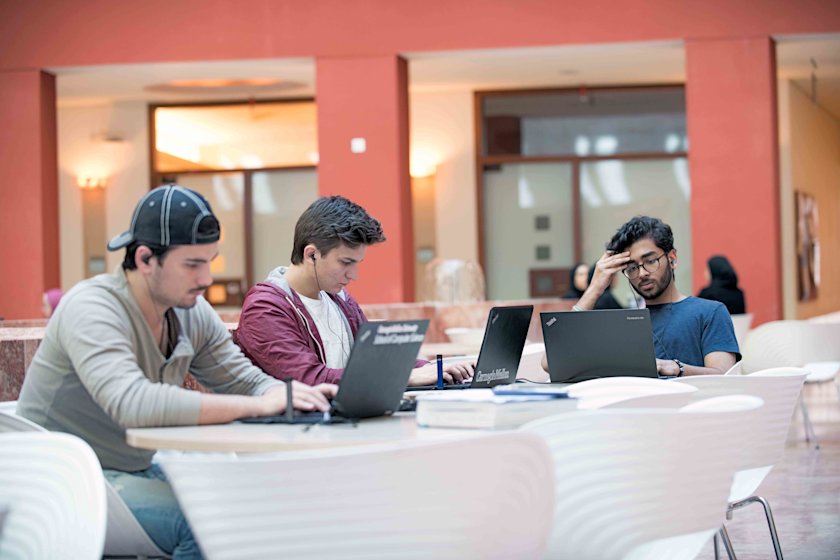
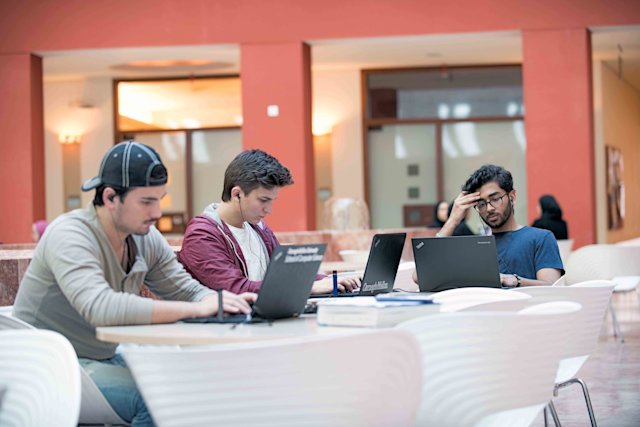
Shining through
Season 12 of QF’s innovation TV show Stars of Science came to a drama-filled conclusion in November – with Lebanese engineer Wadah Malaeb claiming the title of the Arab world’s top innovator.
The 26-year-old emerged victorious with his invention Ductal Organoid-on-a-Chip, which uses organ chip technology to allow cells to grow and reorganize into tissues as if they were in the human body, and provides an efficient and affordable pathway for mass drug testing.
“There is no other program like it,” said an overjoyed Malaeb after learning of his triumph. “Three months on Stars of Science is the equivalent of working three years in the real world.”
A slice of Stars of Science history was also made as Eiman Al-Hamad became the first Qatari female innovator to reach the Grand Final. An expert in information security, her Arabic Conversation Fraud Detection program enables real-time exposure of phone fraud through voice recognition and voice-to-text transcription – a pioneering technology for the region.
Season 12 of QF’s innovation TV show Stars of Science came to a drama-filled conclusion in November – with Lebanese engineer Wadah Malaeb claiming the title of the Arab world’s top innovator.
The 26-year-old emerged victorious with his invention Ductal Organoid-on-a-Chip, which uses organ chip technology to allow cells to grow and reorganize into tissues as if they were in the human body, and provides an efficient and affordable pathway for mass drug testing.
“There is no other program like it,” said an overjoyed Malaeb after learning of his triumph. “Three months on Stars of Science is the equivalent of working three years in the real world.”
A slice of Stars of Science history was also made as Eiman Al-Hamad became the first Qatari female innovator to reach the Grand Final. An expert in information security, her Arabic Conversation Fraud Detection program enables real-time exposure of phone fraud through voice recognition and voice-to-text transcription – a pioneering technology for the region.
Three months on Stars of Science is the equivalent of working three years in the real world
We are so #AUBProud of you @Waddah_Malaeb !
— AUB (@AUB_Lebanon) November 6, 2020
A well-deserved win. #AUB and it's community are so happy for this news. Congratulations! https://t.co/NlxDc0DHbK
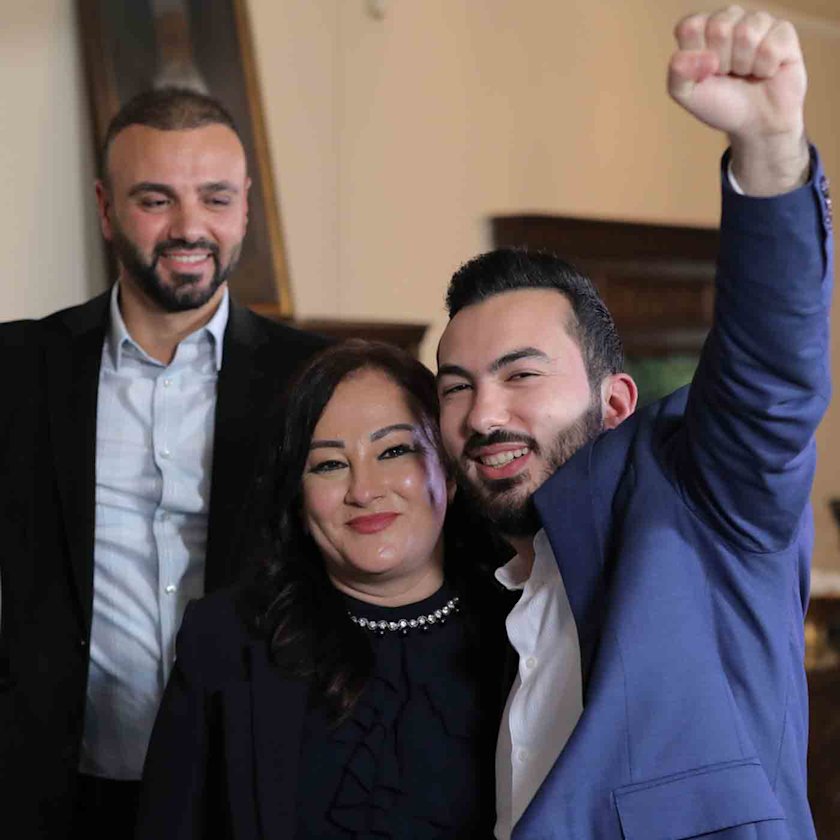
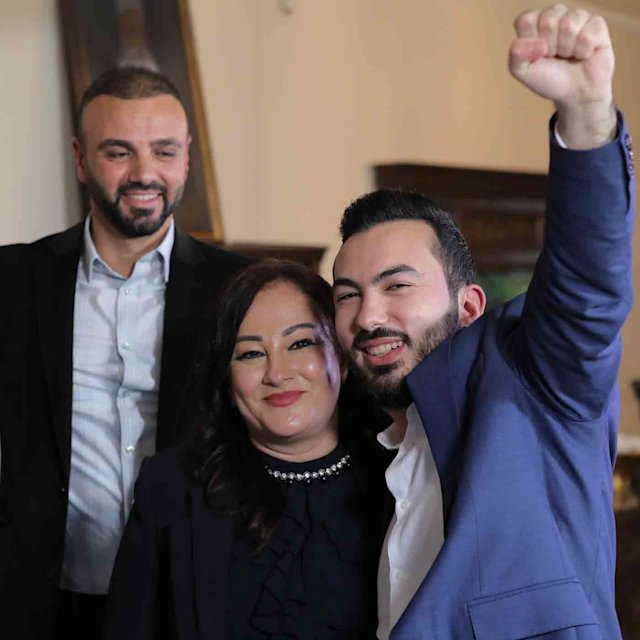
Education, exchange, and inclusivity
From dialogue to data and digitization, November saw new programs, projects, and initiatives emerge from HBKU’s colleges.
Design Post-COVID Humanity: Taaruf, Taawun, Tarahum – was launched by the College of Islamic Studies (CIS) as an educational space for young people to define how stronger, more inclusive communities can be fashioned for the future. CIS also unveiled Genomie, a virtual platform for conversations between experts and the public on genomics.
With the University of Ottawa, the College of Science and Engineering embarked on a project examining information and communications technology use by older people and their carers in Qatar, to support independent living and digital and social inclusion. “This project not only reflects that older persons are an integral part of the family unit in Qatar, but also that family members are increasingly expected to take on caring roles,” said Dr. Dena Al Thani, Assistant Professor at CSE.
And the College of Public Policy introduced menatracker.org – a policy tracker of government responses to COVID-19 in 10 MENA countries, designed to help inform measures to tackle the pandemic.
From dialogue to data and digitization, November saw new programs, projects, and initiatives emerge from HBKU’s colleges.
Design Post-COVID Humanity: Taaruf, Taawun, Tarahum – was launched by the College of Islamic Studies (CIS) as an educational space for young people to define how stronger, more inclusive communities can be fashioned for the future. CIS also unveiled Genomie, a virtual platform for conversations between experts and the public on genomics.
With the University of Ottawa, the College of Science and Engineering embarked on a project examining information and communications technology use by older people and their carers in Qatar, to support independent living and digital and social inclusion. “This project not only reflects that older persons are an integral part of the family unit in Qatar, but also that family members are increasingly expected to take on caring roles,” said Dr. Dena Al Thani, Assistant Professor at CSE.
And the College of Public Policy introduced menatracker.org – a policy tracker of government responses to COVID-19 in 10 MENA countries, designed to help inform measures to tackle the pandemic.
This project not only reflects that older persons are an integral part of the family unit in Qatar, but also that family members are increasingly expected to take on caring roles
HBKU’s College of Islamic Studies has 188 students
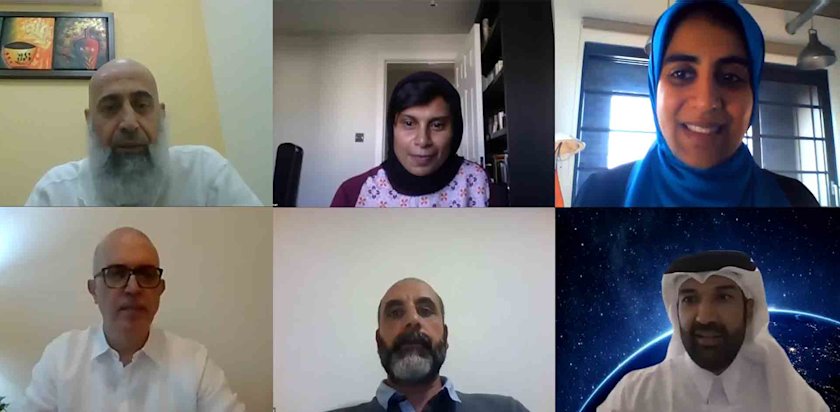
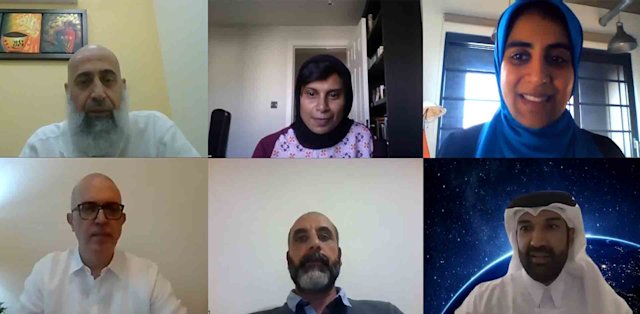
Solar vision
Within HBKU’s research hubs, Qatar Environment and Energy Research Institute (QEERI) became the first Middle East center to work on nano-rectenna devices – a potential game-changer in solar energy conversion.
Rectenna-based solar cells can significantly increase the efficiency of solar energy harvesting, with devices such as those being developed by QEERI also being capable of influencing the future of sensors, detectors, and electronics.
QEERI also launched a pilot project with the Supreme Committee for Delivery & Legacy to explore air quality monitoring at the FIFA World Cup Qatar 2022™, while scientists from HBKU’s Qatar Computing Research Institute (QCRI) published the results of an investigative trial into the impact of Ramadan fasting on diabetes patients. Alongside Hamad Medical Corporation physicians, they used Artificial Intelligence models to assess patient data and predict low blood sugar risks.
“It was an honor to collaborate on a project that resonates with our commitment to tackling computing challenges that positively touch upon people’s lives,” said Dr. Faisal Farooq, Head of QCRI’s Center for Digital Health and Precision Medicine.
Within HBKU’s research hubs, Qatar Environment and Energy Research Institute (QEERI) became the first Middle East center to work on nano-rectenna devices – a potential game-changer in solar energy conversion.
Rectenna-based solar cells can significantly increase the efficiency of solar energy harvesting, with devices such as those being developed by QEERI also being capable of influencing the future of sensors, detectors, and electronics.
QEERI also launched a pilot project with the Supreme Committee for Delivery & Legacy to explore air quality monitoring at the FIFA World Cup Qatar 2022™, while scientists from HBKU’s Qatar Computing Research Institute (QCRI) published the results of an investigative trial into the impact of Ramadan fasting on diabetes patients. Alongside Hamad Medical Corporation physicians, they used Artificial Intelligence models to assess patient data and predict low blood sugar risks.
“It was an honor to collaborate on a project that resonates with our commitment to tackling computing challenges that positively touch upon people’s lives,” said Dr. Faisal Farooq, Head of QCRI’s Center for Digital Health and Precision Medicine.
QEERI has 7 research centers
More than 60 diabetes patients participated in QCRI’s investigative trial on Ramadan fasting
Cracking an equine code
Arabian horses have traditionally dominated the grueling equestrian sport of endurance racing. Now scientists at QF have devised a biochemistry project aimed at determining whether they are fit to take on such a challenge.
A collaboration between QF members the Equine Veterinary Medical Center and Al Shaqab, and QF partner university Weill Cornell Medicine-Qatar, explored the use of a technique called metabolomics to assess the readiness of a horse before a race.
Metabolomics research has proved useful in assessing the performance and health of human athletes, but is rarer in equine circles, with European-based research not being applicable in desert regions. The QF pilot study assessed 62 horses, with a second phase now set to take place.
“This isn’t just about predicting a horse’s performance in a race, it’s also about animal welfare,” said Dr. Tatiana Vinardell, EVMC’s Head of Research and Education. “If we can tell whether a horse is actually ready before subjecting it to a challenging activity, then why not?”
Arabian horses have traditionally dominated the grueling equestrian sport of endurance racing. Now scientists at QF have devised a biochemistry project aimed at determining whether they are fit to take on such a challenge.
A collaboration between QF members the Equine Veterinary Medical Center and Al Shaqab, and QF partner university Weill Cornell Medicine-Qatar, explored the use of a technique called metabolomics to assess the readiness of a horse before a race.
Metabolomics research has proved useful in assessing the performance and health of human athletes, but is rarer in equine circles, with European-based research not being applicable in desert regions. The QF pilot study assessed 62 horses, with a second phase now set to take place.
“This isn’t just about predicting a horse’s performance in a race, it’s also about animal welfare,” said Dr. Tatiana Vinardell, EVMC’s Head of Research and Education. “If we can tell whether a horse is actually ready before subjecting it to a challenging activity, then why not?”
If we can tell whether a horse is actually ready before subjecting it to a challenging activity, then why not?
62 horses were assessed in the QF metabolomics study
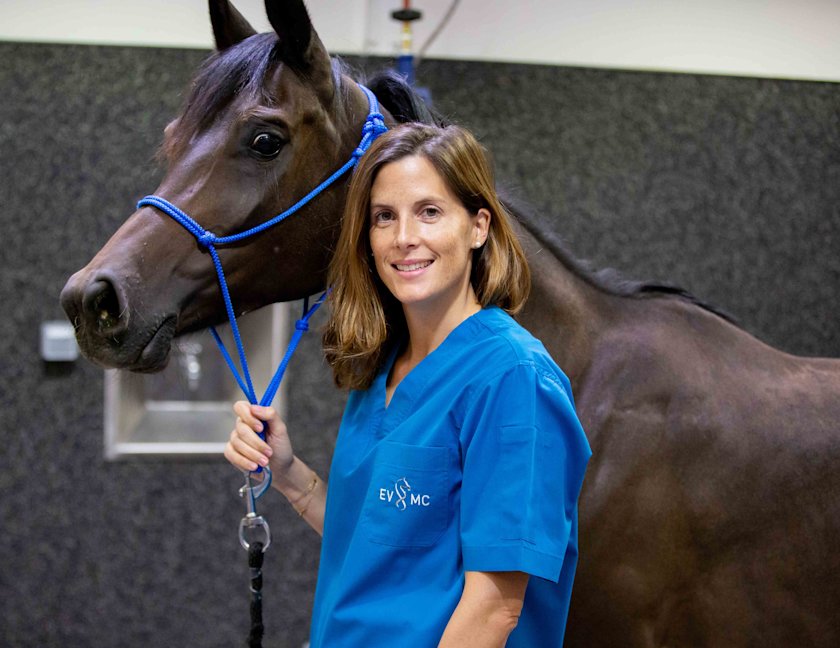
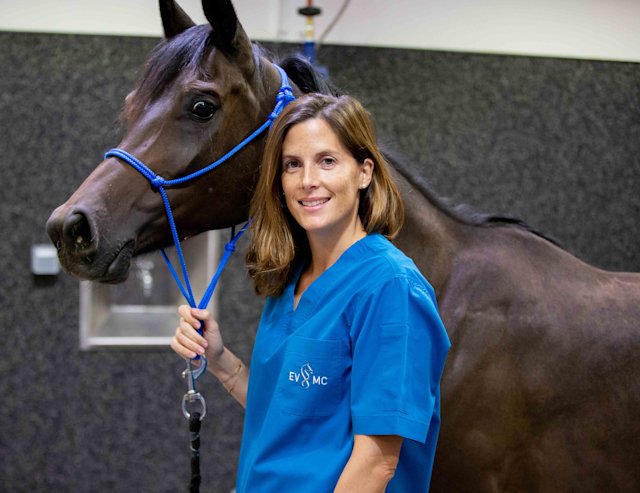
Championing a sustainable environment
Individuals and businesses were urged to create a movement for sustainable change in November, through a week of events - organized by QF’s Qatar Green Building Council - showcasing Qatar’s contribution to the UN Sustainable Development Goals.
The fifth Qatar Sustainability Week featured activities ranging from waste recycling campaigns to school and office sustainability awareness programs, spotlighted innovative solutions to Qatar and the region’s environmental challenges, and hosted ‘Focus Days’ centered on green hospitality for the FIFA World Cup Qatar 2022™, and accelerating a sustainable built environment.
And QF subsidiary Msheireb Properties’ virtual Doha Smart Cities Summit saw international speakers discuss what smart cities mean for current and future generations, their benefit in pandemic times, and their role in supporting sustainability. It also announced that autonomous vehicle tests will be conducted at Msheireb Properties’ pioneering Msheireb Downtown Doha development.
“Smart cities are no longer a matter of choice,” said Engineer Ali Al Kuwari, Acting CEO, Msheireb Properties, “but rather a global trend adopted by countries and corporates to cope with new societal demands.”
Individuals and businesses were urged to create a movement for sustainable change in November, through a week of events - organized by QF’s Qatar Green Building Council - showcasing Qatar’s contribution to the UN Sustainable Development Goals.
The fifth Qatar Sustainability Week featured activities ranging from waste recycling campaigns to school and office sustainability awareness programs, spotlighted innovative solutions to Qatar and the region’s environmental challenges, and hosted ‘Focus Days’ centered on green hospitality for the FIFA World Cup Qatar 2022™, and accelerating a sustainable built environment.
And QF subsidiary Msheireb Properties’ virtual Doha Smart Cities Summit saw international speakers discuss what smart cities mean for current and future generations, their benefit in pandemic times, and their role in supporting sustainability. It also announced that autonomous vehicle tests will be conducted at Msheireb Properties’ pioneering Msheireb Downtown Doha development.
“Smart cities are no longer a matter of choice,” said Engineer Ali Al Kuwari, Acting CEO, Msheireb Properties, “but rather a global trend adopted by countries and corporates to cope with new societal demands.”
Smart cities are no longer a matter of choice, but rather a global trend
The Doha Smart Cities Summit tackled:
- Smart City Cybersecurity
- Mobility and Autonomous Vehicles
- Innovation and Sustainability
- Smart City Pandemic Readiness
